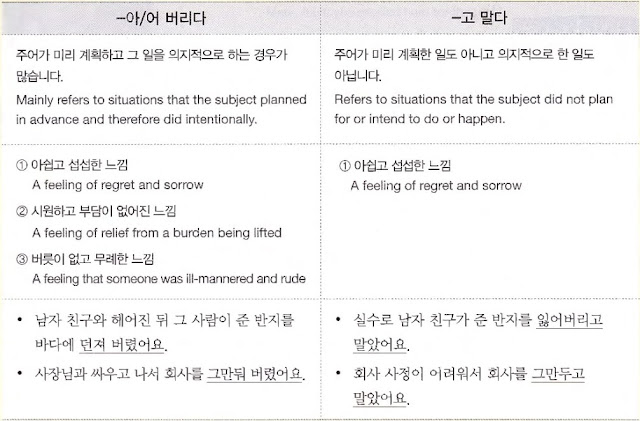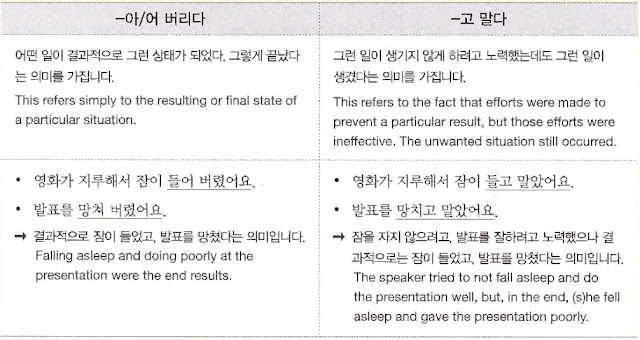 가: 마크 씨, 시험공부 많이 했어요?
가: 마크 씨, 시험공부 많이 했어요?
Mark, have you studied hard for the test?
나: 아니요. 10분만 잔다는 게 그만 아침까지 자고 말았어요.
No, my idea of sleeping for just 10 minutes turned into sleeping until the morning.
가: 자야 씨, 이 과자를 다 먹었어요? 다이어트한다고 하지 않았어요?
Jaya, did you eat all this snack? Didn’t you say you were on a diet?
나: 한 개만 먹으려고 했는데 먹다 보니까 과자를 다 먹고 말았네요.
I was just going to eat one, but after having one I ended up eating them all.
This expression refers to an unplanned event or action that continued until it was completed or thoroughly finished in a way undesired by the speaker. Thus it includes the speaker’s feeling of regret or sorrow with regard to the resulting state of affairs. Only verbs can come before this expression.
 • 그렇게 며칠 동안 밤을 새워서 일을 하면 병이 나고 말 거예요.
• 그렇게 며칠 동안 밤을 새워서 일을 하면 병이 나고 말 거예요.
If you keep staying up all night working for days at a time, you’ll end up getting sick.
• 우리 축구 선수들이 열심히 싸웠지만 상대 팀에게 지고 말았어요.
Our soccer team (players) fought hard, but in the end, they lost to the other team.
• 화재가 나서 문화재가 불에 타고 말았어요.
A fire erupted, and the cultural asset (regrettably) burned to the ground.
1. Because only verbs can come before ‘-고 말다’ combining it with adjectives will result in incorrect sentences.
• 담배를 많이 피우더니 건강이 나쁘고 말았어요. (X)
->담배를 많이 피우더니 건강이 나빠지고 말았어요. (〇)
Because 나쁘다 is an adjective, its verb form ‘나빠지다’ must be used.
2. The expression ‘-고 말다’ can also refer to the subject’s strong will or intention to do something. In such cases, it is often combined with an expression that indicates the speaker’s intention, such as -겠- or -(으)ㄹ 테니까,to form expressions such as -고 말겠다. In addition, these forms are often used together with adverbs such as ‘꼭’ and 반드시.
• 무슨 일이 있어도 오늘밤까지 이 일을 끝내고 말겠습니다.
I’m going to finish this job by tonight no matter what.
• 이번에는 꼭 합격하고 말 테니까 걱정하지 마십시오.
Don’t worry, because this time I’m definitely going to pass (the test).
3. This expression can also be combined with -아/어 버리다 as -아/어 버리고 말았다 to emphasize the speaker’s feeling of regret and sorrow.
① 피자를 먹고 말았어요.
② 피자률 먹어 버리고 말았어요.
Sentence ② expresses a stronger sense of regret than sentence ①.
While both -아/어 버리다 and -고 말다 refer to the completion or finishing of an act or state of affairs, they are different in the following ways.
 However, in cases of events not related to the speaker’s will or Intention, the two expressions have the following differences.
However, in cases of events not related to the speaker’s will or Intention, the two expressions have the following differences.

>> Full of Intermediate grammar: Click here
